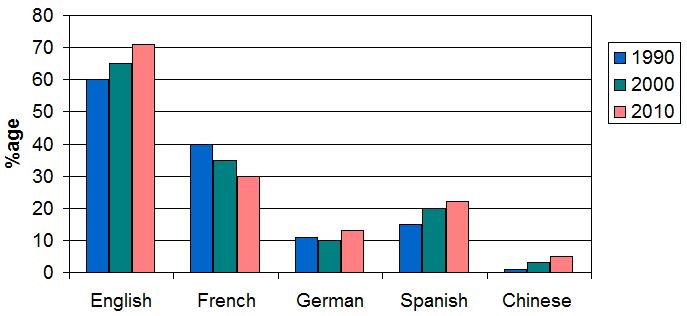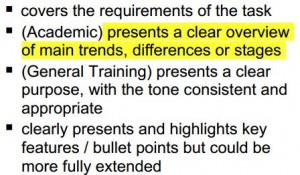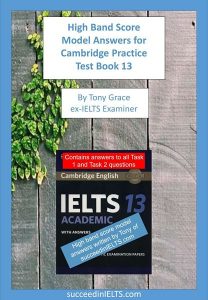Overviews for IELTS Writing Task 1 – Foreign languages
In Writing Task 1, identifying the main trends, differences, or stages is a key skill.
Practise with the question below, and then write an overview.
Click on the tabs to see mine.
The chart below shows the proportion of schoolchildren in Europe studying different foreign languages from 1990 to 2010.
Summarise the information by selecting and reporting the main features, and make comparisons where relevant.

Now write down the main trends and differences before proceeding to the next tab
Comments on overviews
You need a clear overview to get a band score 7 for Task Achievement.
Task Achievement, Band score 7

The word stages refers to processes, and in questions with figures you need to think about trends and differences.
If a question has changes over time, like in this one, it's best to mention both trends and differences.
If there are no trends, like in the one about Australian poverty, I would find at least two differences to mention.
Make it easy for the examiner to give you a 7 - use the word overall, and put your overview in a separate paragraph.
The overview is the first thing the examiner looks for, so don't hide it in the introduction or at the end.
Finally, if there's a total or an average, as in the question about literacy or the one about Australian poverty, I would consider it to be the most important information, so I'd include it in the overview.
For more information on Task 1 questions see here.
See my Task 1 model answers here.
See sample marked students' Task 1 answers here.























Very good
Can you fix this? the figures for children learned Spanish and German were approximately 11% and 15% respectively.
Read this
Thank you very much, Tony,
The figures for children learning Spanish and German were approximately 11% and 15% respectively.
Exactly – See my grammar posts
The bar chart gives information about the rate of European children studying five foreign languages, namely English, French, Spanish, German and Chinese from 1990 to 2010. Overall, all languages given showed an upward trend, except for French, throughout the period shown. Besides this, English was the most widely studied language, while Chinese was the least at all times. At the start of the period, 60% of school children in Europe studied English, followed by French, at 40%. At the same time, the figures for children learned Spanish and German were approximately 11% and 15% respectively. In contrast, that of Chinese… Read more »